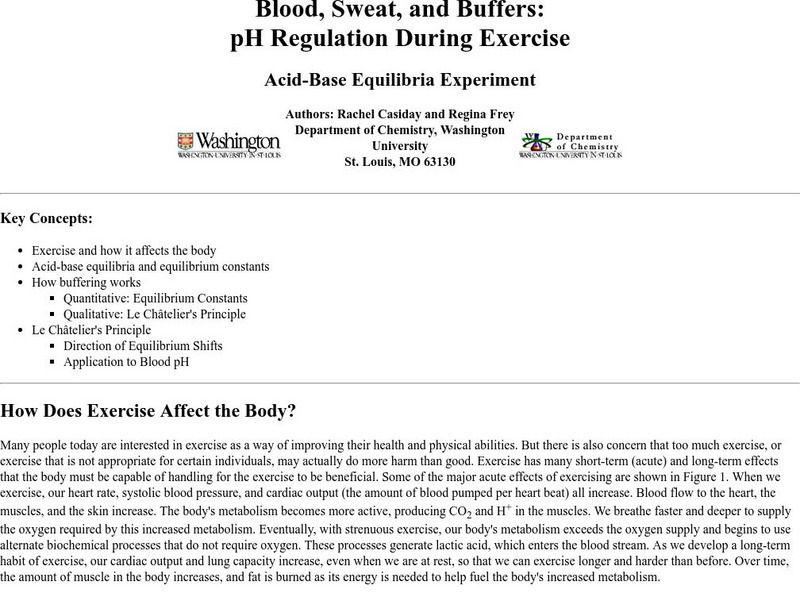Other
Washington University: P H Buffers in the Blood
This site from the Department of Chemistry at the Washington University is an excellent site on how buffers are used in the human body and how they react to exercise.
Other
Siyavula: Everything Maths and Science: P H
This site defines pH and provides several relevant examples and calculations.
Other
University of Cincinnati: Project Step: Acid Rain
STEM Earth Science lesson in which students learn about measuring and determining the PH of a substance and the impact of acid rain on the environment due to changes of PH.
US Geological Survey
U.s. Geological Survey: Water Science for Schools: Acid Rain
An introduction, aimed at upper elementary- and middle-school learners, to acid rain. [Click back to home to access the site in Spanish.]
Clackamas Community College
Clackamas Community College: Amides
A nice website for information on amides. Discusses how they are formed, their structure, the guidelines for naming them (along with examples and practice problems), and the kinds of reactions that amides undergo.
Royal Society of Chemistry
Royal Society of Chemistry: Gridlocks: Level 2
A collection of grid puzzles that cover a wide variety of topics in intermediate high school chemistry. These are excellent for topic review and reinforcement. The puzzles can be played online and also downloaded as worksheets. Answers...
CK-12 Foundation
Ck 12: Ionic Compounds
[Free Registration/Login may be required to access all resource tools.] In the following online tutorial students will name ionic compounds containing main group or transition metals, covalent compounds, acids, and bases, using...
CK-12 Foundation
Ck 12: Molecular Compounds
[Free Registration/Login may be required to access all resource tools.] In the following online tutorial students will name ionic compounds containing main group or transition metals, covalent compounds, acids, and bases, using...
CK-12 Foundation
Ck 12: Acids and Bases
[Free Registration/Login may be required to access all resource tools.] In the following online tutorail students will define acids and bases in terms of the ions that are produced when each type of compound is dissolved in water. They...
University of Colorado
University of Colorado: Ph Et Interactive Simulations: Acid Base Solutions
How do strong and weak acids differ? Use lab tools on your computer to find out! Dip the paper or the probe into solution to measure the pH, or put in the electrodes to measure the conductivity. Then see how concentration and strength...
CK-12 Foundation
Ck 12: Flex Book Textbooks: Chemistry Second Edition
[Free Registration/Login may be required to access all resource tools.] A complete, web-based, multi-media textbook covering a wide variety of Chemistry concepts.
OpenStax
Open Stax: Inorganic Compounds
Learn here about inorganic compounds, substances that do not contain both carbon and hydrogen, and how they are essential to human functioning.
American Chemical Society
American Chemical Society: Science for Kids: Chemical and Physical Change
Engaging hands-on science lessons for grades 2-6 on chemical and physical changes.
Wyzant
Wyzant: Acids and Bases
This site presents everything you need to know about acids and bases and more! Gives a nice description on what acids and bases are, properties of both, strong and weak acids and bases, an overview of pH, and much more.
Sophia Learning
Sophia: Calculations: P H, P Oh, [H+], [Oh ]
Created to teach students of the 21st century, SOPHIA is bringing chemistry calculations straight to your fingertips. Become the commander of your own learning experiences as you take part in this interactive lesson.
Sophia Learning
Sophia: Introduction to Acids and Bases
Created to teach students of the 21st century, SOPHIA is bringing acids and bases straight to your fingertips. Become the commander of your own learning experiences as you take part in this interactive lesson.
TeachEngineering
Teach Engineering: Engineering Out of Harry Situations
Under the "The Science Behind Harry Potter" theme, a succession of diverse complex scientific topics are presented to students through direct immersive interaction. Student interest is piqued by the incorporation of popular culture into...
Frostburg State University
General Chemistry Online: Faq: Acids and Bases
Click the basic questions regarding acids, bases, and pH to view the answers. There are sections on basic concepts, buffer solutions, pH calculation, equilibrium constants, indicators, neutralization reactions, and titrations.
PBS
Zoom: Kitchen Chemistry
Did you know that chemistry can be found in your kitchen? Enter this amazing virtual world where your first stop is to the kitchen. Locate the clues and move on to the Lab Journal where you can test each item in two experiments: Cabbage...
Discovery Education
Discovery Education: Homework Helper: Acids and Bases
As this video introducing properties and uses of acids and bases plays, roll over and click on parts of the presentation to read more information about specific related items and terms, like citric acid, reactions, ionic lights, ammonia,...
Chiral Publishing
Chiral Publishing: An Introduction to Chemistry: Arrhenius Acid Base Reactions: Audio Book
Listen and learn about Arrhenius acid-base reactions while exploring mixtures, solutions, and their reactions. Examine the photos of the examples discussed in this website and discover how arrhenius acid-base reactions occur.
American Chemical Society
Inquiry in Action: Comparing the Amount of Acid in Different Solutions
Students will complete a procedure to find the solution that has the greatest amount of acid by comparing the amount of the acids in different solutions. This lab activity compares the amount of acid in differents solutions in a...
PBS
Pbs Learning Media: Acids and Bases: Cabbage Juice Indicator
In this video segment, the ZOOM cast demonstrates how to use cabbage juice to find out if a solution is an acid or a base.
Chiral Publishing
Chiral Publishing: An Introduction to Chemistry: Acids, Bases, and Acid Base Reactions [Pdf]
Find out everything you ever wanted to know about acids, bases, and acid-base reactions! This in-depth chapter discusses how to name these compounds and how they form solutions.














![Sophia: Calculations: P H, P Oh, [H+], [Oh ] Unit Plan Sophia: Calculations: P H, P Oh, [H+], [Oh ] Unit Plan](https://content.lessonplanet.com/knovation/original/218428-81e36f3b80bf76c44b558309eac1c9b2.jpg?1661242989)






